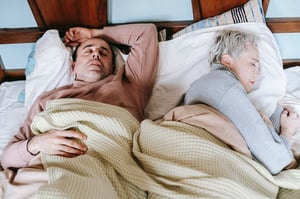Breath is life force and essential to supporting all the functions and systems in our bodies,...
Do You Suffer From Prolonged Stress? Try Conscious Rest
The latest research shows that rates of stress have skyrocketed since the start of the pandemic, and it is starting to affect our health. A big part of this is isolation, working from home, and disrupting our usual social activities, leaving us feeling disconnected and tired.
An online article published in Healthline on February 5, 2021, interviewed the service chief of a psychiatric hospital in Baltimore, Maryland, Dr. Michael Young. In the interview, he stated, “Social connection is a fundamental source of well-being and renewal for most people, and the ongoing social restrictions from the pandemic continue to disrupt many of the well-established social routines.”
We, as humans, are social beings. We require interaction with others. The inability to do so increases the body’s natural stress response, amping up our nervous systems, leaving us feeling more vulnerable, increasing our pain.
The article also interviews the associate director of clinical programs at the University of California San Francisco (UCSF) Osher Center for Integrative Medicine, Dr. Judith Cuneo. In the interview, she stated to Healthline, “That low-level chronic stress can put us into that sympathetic nervous system activation, that ‘fight or flight stress reaction”.
When we maintain a sympathetic nervous system state for extended periods, our heart rate, blood pressure, and respiration rate increase, as do our cortisol levels (stress hormone) in the body. Optimal digestion is hindered, blood glucose rises, and so can cholesterol.
 Everyone can relate to how stress causes low-quality sleep.
Everyone can relate to how stress causes low-quality sleep.
A new and thought-provoking book, Wintering: The Power of Rest and Retreat in Difficult Times, released Jan 25, 2021, by Author Katherine May, challenges readers to see the great benefit and transformation that comes from conscious rest. What if these pandemic times present an opportunity to be completely honest with ourselves?
Katherine May writes:
“I’m tired, inevitably. But it’s more than that. I’m hollowed out. I’m tetchy and irritable, constantly feeling like prey, believing that everything is urgent and that I can never do enough. And my house—my beloved home—has suffered a kind of entropy in which everything has slowly collapsed and broken and worn out, with detritus collecting on every surface and corner, and I have been helpless in the face of it.”
May offers a raw and authentic reflection of her experiences. She invites readers to recognize the power in rest between the seasons and cycles of our lives. She challenges readers to embrace uncertainty, ambiguity, and the possibilities for growth that exist in the liminal spaces of winter.
Societally, we tend to rest only when needed - when we are sick or forced to take a break.
This beautiful quote captures the essence of Katherine May’s message:
“Doing those deeply unfashionable things—slowing down, letting your spare time expand, getting enough sleep, resting—is a radical act now, but it is essential. This is a crossroads we all know, a moment when you need to shed a skin. If you do, you’ll expose all those painful nerve endings and feel so raw that you’ll need to take care of yourself for a while. If you don’t, then that skin will harden around you.”
 Rather than viewing rest as weakness, what if we embrace conscious slowing down? What if we support our strung-out minds and nervous systems with exercises that replenish, rejuvenate, and restore?
Rather than viewing rest as weakness, what if we embrace conscious slowing down? What if we support our strung-out minds and nervous systems with exercises that replenish, rejuvenate, and restore?
Resolve Pain Guru wholeheartedly agrees in the necessity of regular rest. This idea makes up the second pillar of The Method we teach. So rest and Nourish Your Nervous System consciously, deliberately, and regularly. Notice what opportunities for transformation arise from practicing conscious rest.
Related Content:






